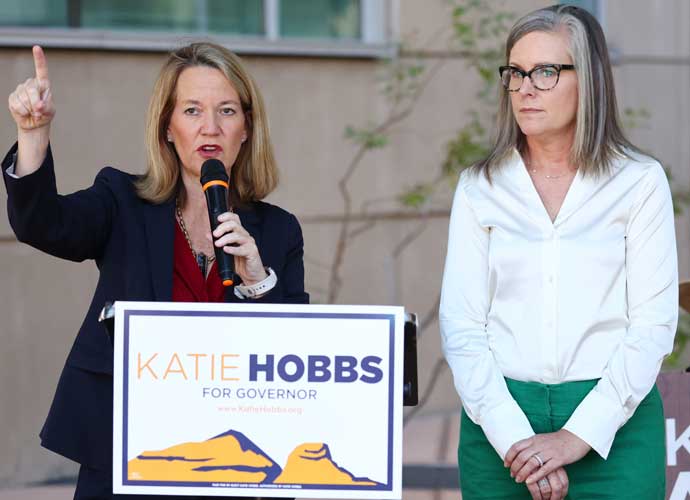Harvey Weinstein Denies Salma Hayek’s Sexual Assault Allegations
Salma Hayek wrote an essay for the New York Times outlining her sexual assault experience with Hollywood predator Harvey Weinstein. In response, Weinstein’s lawyer released a statement that the producer denies all of Hayek’s claims against him.
SALMA HAYEK ACCUSES HARVEY WEINSTEIN; HE DENIES ALLEGATIONS
“For years, he was my monster,” Hayek wrote in her essay, “Harvey Weinstein is My Monster Too.” “This fall, I was approached by reporters, through different sources, including my dear friend Ashley Judd, to speak about an episode in my life that, although painful, I thought I had made peace with,” she continued. “I had brainwashed myself into thinking that it was over and that I had survived; I hid from the responsibility to speak out with the excuse that enough people were already involved in shining a light on my monster. I didn’t consider my voice important, nor did I think it would make a difference.”
Hayek explains that, at the time when her career was just getting started, Weinstein and his powerhouse company Miramax was the be-all-end-all of the film industry. She was excited to work with him, but that excitement soon turned to dread with his sexual advances. “He had validated the last 14 years of my life. He had taken a chance on me — a nobody. He had said yes,” she writes. “Little did I know it would become my turn to say no.”
Hayek says she had to turn down Weinstein’s requests to shower with him or let him watch her shower. “No to letting him give me a massage, no to letting a naked friend of his give me a massage, no to letting him give me oral sex, no to my getting naked with another woman. No, no, no, no, no… And with every refusal came Harvey’s Machiavellian rage,” she said. “I don’t think he hated anything more than the word ‘no.'”
Hayek continued by describing her work with Weinstein on her Frida Kahlo biopic that she starred in. She was told it would never succeed, but the actress recruited big names such as Julie Taymor, Edward Norton, Antionio Banderas, Ashley Judd, and Geoffrey Rush to get the film off the ground. “Ironically, once we started filming, the sexual harassment stopped but the rage escalated,” Hayek writes. Until he threatened to end the film unless she did a full-frontal nude sex scene with another woman. She conceded, desperate to get the film made, but she was “so emotionally distraught that I had to distance myself during the postproduction… even thought Frida eventually won [Weinstein] two Oscars, I still didn’t see any joy.”
At the end of her essay, Hayek spoke more broadly about the female experience in Hollywood. “I am grateful for everyone who is listening to our experiences,” she said. “I hope that adding my voice to the chorus of those who are finally speaking out will shed light on why it is so difficult, and why so many of us have waited so long. Men sexually harassed because they could. Women are talking today because, in this new era, we finally can.”
Weinstein, in his response, focused more on Hayek’s depiction of the filming of Frida, and countered many of her claims. He only briefly spoke on the topic of sexual harassment. “Mr. Weinstein does not recall pressuring Salma to do a gratuitous sex scene with a female co-star and he was not there for the filming… All of the sexual allegations as portrayed by Salma are not accurate and others who witnessed the events have a different account of what transpired,” the statement said on the exec’s behalf. “Mr. Weinstein regards Salma Hayek as a first-class actress and cast her in several of his movies, among them Once Upon a Time in Mexico, Dogma, and Studio 54. He was very proud of her best-actress Academy Award nomination for Frida and continues to support her work.”
Read the full text of his statement below.
Mr. Weinstein regards Salma Hayek as a first-class actress and cast her in several of his movies, among them Once Upon a Time in Mexico, Dogma, and Studio 54. He was very proud of her best-actress Academy Award nomination for Frida and continues to support her work.
While Jennifer Lopez was interested in playing Frida and at the time was a bigger star, Mr. Weinstein overruled other investors to back Salma as the lead. Miramax put up half of the money and all of the P&A; the budget was over $12 million. As in most collaborative projects, there was creative friction on Frida, but it served to drive the project to perfection.
The movie opened in multiple theaters and was supported by a huge advertising campaign and an enormous Academy Awards budget.
Mr. Weinstein does not recall pressuring Salma to do a gratuitous sex scene with a female co-star and he was not there for the filming. However, that was part of the story, as Frida Kahlo was bisexual and the more significant sex scene in the movie was choreographed by Ms. Hayek with Geoffrey Rush. The original unibrow used was an issue because it diverted attention from the performances. All of the sexual allegations as portrayed by Salma are not accurate and others who witnessed the events have a different account of what transpired.
Ed Norton, who was Ms. Hayek’s boyfriend at the time, [worked with Mr. Weinstein on the rewrite of the script in Mexico] did a brilliant job of rewriting the script and Mr. Weinstein battled the W.G.A. to get him a credit on the film. His effort was unsuccessful to everyone’s disappointment.
By Mr. Weinstein’s own admission, his boorish behavior following a screening of Frida was prompted by his disappointment in the cut of the movie—and a reason he took a firm hand in the final edit, alongside the very skilled director Julie Taymor.
RELATED ARTICLES
Get the most-revealing celebrity conversations with the uInterview podcast!








Leave a comment